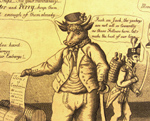 The Jay Heritage Center hosted its second free lecture in a series devoted to fostering a better understanding of the War of 1812 in this, the war’s Bicentennial year.
The Jay Heritage Center hosted its second free lecture in a series devoted to fostering a better understanding of the War of 1812 in this, the war’s Bicentennial year.
By Robin Jovanovich
 The Jay Heritage Center hosted its second free lecture in a series devoted to fostering a better understanding of the War of 1812 in this, the war’s Bicentennial year. Dr. Allison Stagg, a Jane and Morgan Whitney Fellow at the Metropolitan Museum of Art, captivated her guests with a unique presentation on the origins and development of American political caricature before and during this period of conflict. Dr. Stagg compared a folk art watercolor in the Jay collection modeled after a well-known print by Amos Doolittle, a self-taught engraver from Connecticut, with its original counterpart. She explained how pieces like this satire of “Bonaparte in Trouble” would have been part of the American consciousness.
The Jay Heritage Center hosted its second free lecture in a series devoted to fostering a better understanding of the War of 1812 in this, the war’s Bicentennial year. Dr. Allison Stagg, a Jane and Morgan Whitney Fellow at the Metropolitan Museum of Art, captivated her guests with a unique presentation on the origins and development of American political caricature before and during this period of conflict. Dr. Stagg compared a folk art watercolor in the Jay collection modeled after a well-known print by Amos Doolittle, a self-taught engraver from Connecticut, with its original counterpart. She explained how pieces like this satire of “Bonaparte in Trouble” would have been part of the American consciousness.
In her preamble, Dr. Stagg introduced the audience to images of several European caricaturists,  including Britain’s James Gillray and Scotsman Isaac Cruikshank, who directly influenced the mannerisms of American practitioners like Doolittle and fellow engraver, William Charles of New York and Philadelphia. She allowed how the War of 1812 fed the imagination of these enterprising men as they deftly transformed news bulletins of battles between warships — the Wasp, Peacock, and Queen Charlotte — into derisive animal characters; their vignettes poked fun at the Crown and Great Britain personified as “John Bull. Several caricatures in the slide show specifically lambasted Britain’s defeat at the hands of Oliver Hazard Perry at Lake Erie. These drawings fed the populace’s appetite for humor, while also earning their creators a living through sales of these immediate patriotic images.
including Britain’s James Gillray and Scotsman Isaac Cruikshank, who directly influenced the mannerisms of American practitioners like Doolittle and fellow engraver, William Charles of New York and Philadelphia. She allowed how the War of 1812 fed the imagination of these enterprising men as they deftly transformed news bulletins of battles between warships — the Wasp, Peacock, and Queen Charlotte — into derisive animal characters; their vignettes poked fun at the Crown and Great Britain personified as “John Bull. Several caricatures in the slide show specifically lambasted Britain’s defeat at the hands of Oliver Hazard Perry at Lake Erie. These drawings fed the populace’s appetite for humor, while also earning their creators a living through sales of these immediate patriotic images.
Dr. Stagg is editing her Ph.D. dissertation, “The Art of Wit: Political Caricature in the United States 1780-1830” for publication and hopes to return to the Jay Centerwhen it is completed. A collection of original American political caricatures in the Jay collection will go on view in May as part of their commemoration of the Bicentennial of the war of 1812.
The free program was sponsored by the NY Council for the Humanities.















